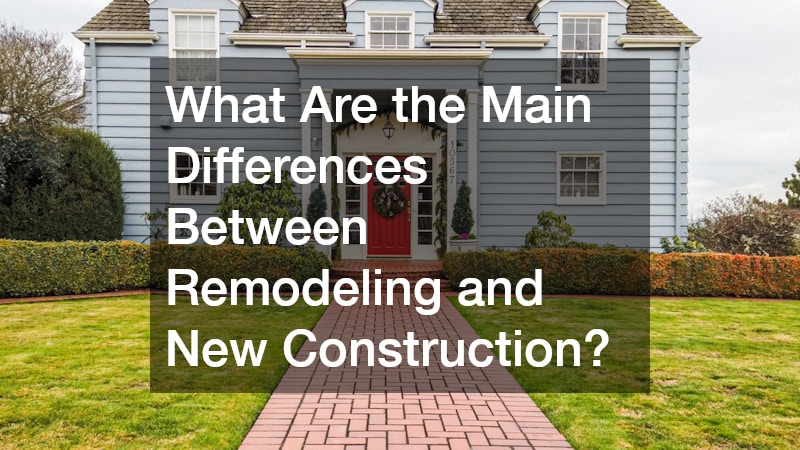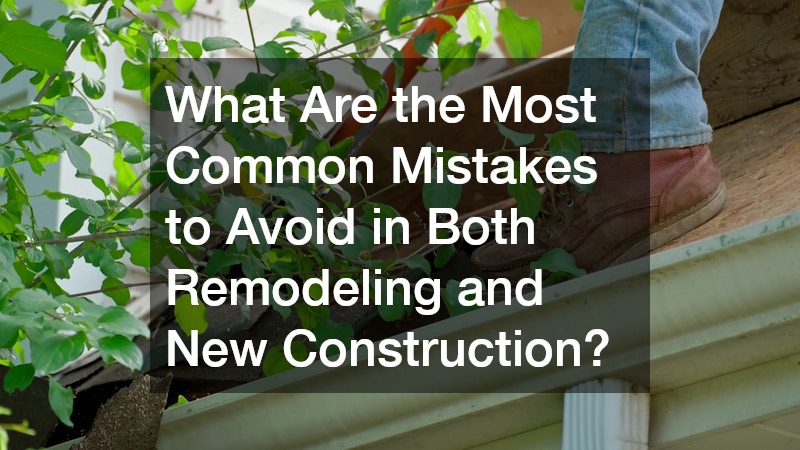When comparing remodel vs. new construction, one of the most overlooked yet influential aspects is roofing. Whether you’re updating an older home or building from the ground up, the roof plays a central role in determining the project’s cost, timeline, energy efficiency, and overall longevity. Homeowners often find themselves weighing the pros and cons of keeping an existing structure versus starting fresh, and roofing frequently becomes the deciding factor.
Working with an expert roofer can reveal how much life remains in your current roof and whether repairs or full roof replacement make more financial sense. While remodeling can be less disruptive, it may also involve adapting existing materials or structures that limit design flexibility. New construction, meanwhile, opens the door to modern roofing designs and materials, from traditional asphalt shingles to durable metal roofing.
This article explores how roofing considerations influence every stage of the decision-making process. We’ll look at how roofing contractors, materials, codes, and energy efficiency each play a part in choosing between remodel vs. new construction — helping homeowners make a well-informed choice that fits their long-term goals.
What Are the Main Differences Between Remodeling and New Construction?

Cost Considerations
When evaluating remodel vs. new construction, cost is the first factor most homeowners analyze. Remodeling can often be less expensive upfront because it works with an existing framework, but the savings can shrink quickly if the roof needs major structural repairs. Roof replacement costs vary widely based on materials, labor rates, and local conditions. Consulting with a local roofing company can help you understand how much value can realistically be preserved from your current roof.
In contrast, new construction offers cost predictability. You’re starting with a clean slate, which allows roofers and other contractors to design and install roofing systems without the limitations of older structures. Although a new roof installation might be pricier initially, it often comes with warranties and higher energy efficiency that offset long-term expenses. Roofing contractors emphasize that when budgeting for either choice, the roofing component should never be treated as an afterthought — it’s a major investment that protects everything beneath it.
Time Frame
Time can be another deciding factor in remodel vs. new construction. Remodeling projects generally move faster since they rely on existing foundations and framing. However, unexpected roofing issues can extend the timeline, especially if hidden water damage or poor ventilation is discovered once work begins.
Roofing services for remodels often require precision and coordination with other trades, such as electricians or HVAC professionals. On the other hand, new construction allows roofing company teams to plan installations in sequence with other phases, ensuring fewer delays. Whether you choose to work with local roofers or a larger roofing company, understanding how time and scheduling interact with roofing work can help prevent costly overruns.
Scope of Work
The scope of work differs significantly in remodel vs. new construction. Remodeling focuses on selective updates — perhaps replacing worn shingles, repairing flashing, or upgrading insulation under the roof deck. In many cases, a local roofing company might recommend partial roof replacement to extend the roof’s lifespan.
New construction projects, however, involve full-scale roof installations, giving homeowners and roofing contractors freedom to design systems that complement architectural style and regional climate. Metal roofing, for instance, is increasingly popular in new builds for its strength and longevity. Whether you’re restoring or starting from scratch, defining the scope of roofing work early in the process ensures realistic expectations for both cost and duration.
How Does Roofing Material Choice Affect Remodeling vs. New Construction?
Popular Roofing Materials
Roofing materials shape both the appearance and performance of your home, making them crucial in remodel vs. new construction decisions. Common materials include asphalt shingles, clay tiles, slate, and metal roofing — each offering distinct benefits.
Remodeling projects often favor materials that can integrate smoothly with the home’s existing aesthetic. An expert roofer can assess whether the roof structure can handle heavier options like slate or tile. Meanwhile, new construction projects have more flexibility, allowing roofing contractors to recommend the most efficient materials from the ground up. Many local roofers now highlight metal roofing as a durable, energy-efficient option that suits both modern and traditional homes.
Longevity and Maintenance
Maintenance and lifespan are major considerations in remodel vs. new construction. A remodeled home with a newer roof may only require occasional roofing services such as inspections, gutter cleaning, and small repairs. However, if your roof is nearing the end of its life, a full roof replacement could make remodeling less practical.
New construction allows homeowners to start with a fresh roofing system that can last 40–70 years, depending on the material. Working with experienced roofers ensures proper installation and ventilation, which are essential for preventing premature wear. Roofing contractors often recommend investing in higher-quality materials during construction, as it minimizes maintenance costs over decades.
Aesthetic Appeals
A home’s roof defines its character, which is why aesthetics are vital in remodel vs. new construction. Remodeling typically requires balancing old and new — for example, updating shingles to match existing siding or choosing a roofing color that complements older brickwork. A skilled local roofing company can help blend modern materials with historic architecture.
What Are the Zoning and Building Code Implications for Each Option?
Impact of Local Regulations
Local regulations play a big role in the remodel vs. new construction debate. Remodeling projects must adhere to existing zoning laws, which may restrict height, slope, or roofline modifications. For instance, some neighborhoods limit the type of metal roofing allowed due to reflectivity or historical preservation rules.
When constructing a new home, roofing contractors work closely with local building authorities to ensure compliance from day one. Partnering with a reputable local roofing company can simplify the process — they’re familiar with regional codes and can anticipate potential permitting challenges. In both cases, it’s crucial to verify that all roofing services align with current standards to avoid fines or rework.
Permitting Process
New construction permits are more extensive, covering everything from the foundation to final roofing installations. While the paperwork is heavier, it ensures your roofing company can execute designs without running afoul of municipal regulations. Local roofers often assist homeowners by gathering required documents and scheduling inspections, ensuring smoother progress and compliance throughout the project.
Legal Considerations
Legal considerations can make or break a project. In remodel vs. new construction, homeowners must ensure that their chosen roofing contractors are licensed, insured, and bonded. Liability coverage is critical — especially if structural changes or roof installations are involved.
How Do Roofing Designs Differ in Remodels Versus New Constructions?

Design Flexibility
Design flexibility is one of the biggest contrasts in remodel vs. new construction. Remodeling limits roofing options to the structure’s existing framework. That means major design shifts — such as changing a gable roof to a hip roof — might not be feasible without substantial reconstruction.
By contrast, new construction allows roofing contractors to collaborate with architects to create fully custom roof designs. Whether using metal roofing or composite shingles, the process is streamlined and integrated into the overall design vision. Local roofers can suggest energy-efficient layouts, proper ventilation paths, and gutter placements that align with the new structure’s orientation and size.
Architectural Considerations
Existing architecture heavily influences roofing design in remodeling projects. Roofers often work to maintain harmony between old and new elements, preserving curb appeal. For example, an older craftsman home might not support the weight of a modern tile roof, making asphalt or lightweight metal roofing more practical.
Trends in Roofing Designs
For new builds, trends lean toward sustainability and bold aesthetics. Standing seam metal roofing and green roof systems are becoming increasingly common. Roofing contractors often highlight how new construction allows for seamless integration of ventilation systems and energy-efficient designs from the outset. Whether remodeling or building new, staying updated with these design trends ensures your investment remains modern and durable for years to come.
What Role Does Energy Efficiency Play in the Choice Between Remodeling and New Construction?
Energy-Efficient Roofing Options
Energy performance is a core factor in remodel vs. new construction. For remodels, an expert roofer can assess whether reflective shingles, improved insulation, or roof coatings can enhance efficiency without replacing the entire structure. Roofing services that include better attic ventilation and radiant barriers can significantly reduce energy bills.
New construction, however, provides more opportunities for integration. Roofing contractors can install cool roofs or metal roofing designed with reflective pigments to minimize heat absorption. Local roofers can also recommend materials certified by ENERGY STAR, ensuring long-term savings on heating and cooling.
Long-Term Savings
Energy efficiency impacts the total cost of ownership in remodel vs. new construction. Even if remodeling costs less upfront, outdated roofing may increase utility bills over time. Roof replacement with modern materials can balance that equation by lowering monthly expenses.
In new builds, the roofing system can be optimized from the start — with proper insulation layers, efficient ventilation, and solar-ready infrastructure. Roofing company experts emphasize that homeowners should consider not just the immediate costs but the long-term operational savings that come from energy-efficient roofing installations.
Compliance With Energy Codes
Both remodels and new construction must meet local and national energy codes. Remodeling projects may need to upgrade old insulation or ventilation systems to comply. A knowledgeable local roofing company ensures that updates align with current standards, preventing future compliance issues.
New construction, by contrast, must meet the latest efficiency benchmarks before occupancy. Roofing contractors typically handle compliance documentation during the permitting process. This integrated approach ensures homeowners benefit from cutting-edge materials and methods that improve both comfort and sustainability.
What Are the Resale Value Implications of Roofing in Both Scenarios?
Market Trends
In real estate, roofing plays a significant role in determining market value, whether you’re weighing remodel vs. new construction. A well-maintained roof can boost curb appeal and assure buyers that the property is structurally sound. For remodeled homes, replacing an aging roof with modern materials—such as architectural shingles or metal roofing—can yield a strong return on investment.
Roofing contractors often point out that today’s buyers look for energy-efficient materials and modern roof installations that reduce long-term maintenance. Working with an expert roofer ensures the project meets buyer expectations and complies with inspection standards. New construction, on the other hand, inherently benefits from a brand-new roof that aligns with current design trends and energy codes. Local roofers can guide builders on which roofing services provide the best resale advantage in their specific market.
Return on Investment
Return on investment (ROI) is a major factor when comparing remodel vs. new construction. Roof replacement typically delivers one of the highest ROIs among exterior renovations, often recouping 60–70% of its cost at resale. A local roofing company can provide realistic estimates on potential gains, depending on neighborhood trends and material selection.
New construction projects may not see immediate ROI from roofing alone, but the combined value of a new structure and long-lasting roofing system provides security and reduced maintenance costs. Many roofing contractors suggest that homeowners opting for new builds invest in durable materials such as metal roofing to ensure the best long-term financial return.
How Does Weather and Climate Influence the Decision?

Local Weather Conditions
Climate plays a pivotal role in remodel vs. new construction decisions, especially concerning roofing. In regions with heavy snow, high winds, or frequent storms, the existing roof structure might struggle to handle the stress. Roof replacement or reinforcement can help in remodel scenarios, but sometimes new construction is the more practical solution.
Material Suitability
Not all roofing materials perform equally in every environment. Asphalt shingles may work well in mild climates but degrade faster under intense sunlight or humidity. Roofing contractors typically recommend metal roofing for its resistance to corrosion and temperature extremes.
In remodel vs. new construction, material suitability should be considered early in planning. Remodeling may limit your options if the existing structure can’t support heavier materials like tile or slate. New construction, however, offers the freedom to design with regional resilience in mind, allowing your roofing company to incorporate stronger trusses or advanced ventilation from the start.
What Financing Options Are Available for Remodeling vs. New Construction?
Types of Loans
Financing is a critical component in the remodel vs. new construction debate. Remodeling often qualifies for home equity loans or lines of credit, which use existing home value as collateral. These can be ideal for roof replacement or other targeted roofing services.
New construction requires different financing, such as construction-to-permanent loans that cover both building and mortgage phases. A trusted roofing company can often connect homeowners with lenders familiar with construction-related expenses, ensuring roofing costs are accurately reflected in the total loan. Expert roofers may also provide documentation to help with financing approval, particularly for high-value materials like metal roofing.
Interest Rates and Terms
Interest rates vary depending on the scope of the project. Remodels generally benefit from shorter-term loans with lower rates, especially if the work is limited to upgrades like roof replacement. Local roofers can often provide cost estimates that help lenders assess project scope and risk more accurately.
How Do Contractor Selection and Labor Differ in Remodeling vs. New Construction?
Finding the Right Professionals
Choosing the right professionals is one of the most important steps in remodel vs. new construction. Remodeling projects often require an expert roofer skilled in assessing existing structures and working around occupied spaces. Local roofers are especially valuable because they understand local climate challenges, permitting requirements, and material availability.
For new builds, roofing contractors collaborate closely with builders and architects from the start. A reputable roofing company ensures the roof integrates seamlessly into the overall design while meeting safety codes. Always check licenses, insurance, and reviews before hiring any roofer to avoid costly errors later.
Labor Costs
Labor costs can vary greatly between remodel vs. new construction. Remodels often involve more manual effort due to the complexity of working around existing structures, which can make roof replacement labor-intensive. Local roofing companies may charge more for these jobs because they require precision and careful removal of old materials.
What Are the Most Common Mistakes to Avoid in Both Remodeling and New Construction?

Overlooking Roof Maintenance
One of the biggest mistakes homeowners make after remodel vs. new construction projects is neglecting ongoing maintenance. Even a brand-new roof requires periodic inspections to identify wear or debris buildup. Partnering with a local roofing company for annual maintenance services can extend your roof’s lifespan and preserve its warranty.
Ignoring Building Codes
Ignoring building codes can cause serious setbacks. In remodel vs. new construction, compliance is non-negotiable. Roofing contractors must adhere to regional standards governing slope, fire resistance, and insulation. Using unlicensed roofers or skipping inspections can result in fines or forced rework.
Skipping Professional Advice
Attempting DIY roofing work or skipping expert consultations is another common pitfall. Roofing systems are complex, and mistakes can lead to leaks, structural issues, or voided warranties. Engaging an expert roofer ensures that every decision—from material selection to installation technique—is informed by professional insight.
Even in new construction, relying solely on builders without consulting roofing specialists can lead to missed efficiency opportunities. Roofing services performed by licensed contractors deliver peace of mind and long-term durability.
Deciding between remodel vs. new construction requires balancing cost, time, design, and long-term goals—but roofing is often the linchpin that influences every other factor. A well-designed and properly installed roof defines a home’s durability, efficiency, and value. Whether you’re replacing an aging structure or building new, roofing decisions should never be an afterthought.
